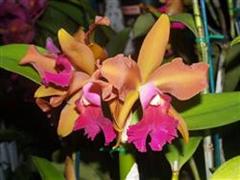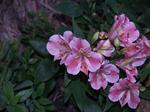Learn to Grow Plants with Micropropagation Techniques
-
Start a hobby, set up a business, or get a job
-
Learn how you can propagate tens of thousands of plants from just one parent plant; and with as little space (to start) as a 10 sqare metre room.
Plant tissue usually goes through several distinct stages in the tissue culture lab:
 1. The first stage is normally when there is rapid vegetative growth. The aim of this stage is to increase the amount of tissue from which plants can be developed.
1. The first stage is normally when there is rapid vegetative growth. The aim of this stage is to increase the amount of tissue from which plants can be developed.
2. The next stage is usually to differentiate the parts of the plant (i.e. stimulate roots etc).
3. The final stage is usually a conditioning stage (i.e. hardening up or bringing the tissue into a condition which is better able to be removed from the tissue culture environment.
Each stage will usually require some changes in the growing environment (e.g. a different growing media, light conditions, temperature etc.)
Course Content and Structure
There are 9 lessons in this course:
- Introduction including a review of basic plant nutrition.
- Stages in tissue cultured plant development
- Introduction to Plant Growth Science, biochemical processes and cell biology
- Transpiration, Photosynthesis and Respiration
- Plant Parts -Stems, Leaves, Roots, Buds,Flowers and fruits
- What happens as Tissue Matures
- Types of Plant Tissue
- Methods of Shoot Induction and Proliferation
- Advantitious Roots
- Terminology
- Plant Nutrients
- Major Elements
- Minor (Trace) Elements
- Total Salts
- How Plants Grow
- Factors Affecting Nutrient Uptake
- Nutrient Solution Preparation
- Hydroponic Nutrients
- Chelates
- Growing Media for Tissue Culture
- Water in Tissue Culture
- Chemical Analysis
- The Laboratory
- The Tissue Culture Laboratory
- Preparation Area
- Transfer Chamber
- Culture Growing Area
- Siting a New Lab
- Equipment Requirements for a Lab
- Chemicals
- Micropropagation Techniques
- Stock Plants -selection, planting, management
- Uses for Tissue Culture
- Problems with Tissue Culture
- Procedures
- Explants
- Sterilisation
- Nutrient Media
- Shoot Induction and Proliferation
- Rooting and Planting Out
- Stages in Plant Development
- Treating Plant Tissue with Sterilants
 Plant Hormones
Plant Hormones
- Chemical Growth Modification
- Principles of Using Plant Hormones
- Auxins, Cytokinins, Gibberellins, Abscisic acid and Ethylene.
- Other Chemical Treatments
- The Tissue Culture Environment
- Media Types -Filter Bridge, Agar, Liquid
- Nutrient Media Composition
- Cleanlines
- Light and Temperature
- Hormones
- Artificial Light
- Water Quality
- Water Treatgments
- Carbon Dioxide Effects
- Greenhouses
- Diagnosis of Plant Disorders
- Commercial Applications
- Understanding Genetics and Plant Breeding
- Biotechnology
- Cell Fusions
- Overcoming Pollination Incompatibility
- Pollination Biology
- Taking Plants out of Culture
- Hardening off Plants
- Growing Rooms or Chambers
- Rockwool Applications with Micropropagation
- Culture of Selected Species
- Begonia
- Cattleya
- Cymbidium
Review of a range of other plants Each lesson culminates in an assignment which is submitted to the school, marked by the school's tutors and returned to you with any relevant suggestions, comments, and if necessary, extra reading.
Course Duration: 100 hours
What Do You Need to Do this Course?
If you are passionately interested in tissue culture, you can do this course. You do not need to have access to a tissue culture laboratory; but if you do, it can be useful.
Some people do this course in preparation for setting up a tissue culture laboratory, or seeking work in this field. Others undertake the course purely out of an academic interest in the subject. Whether your reason is one of these things, or something else does not matter. As long as you have a thirst for learning about tissue culture, this course can be undertaken successfully anywhere and at any time.
What Makes up a Tissue Culture Laboratory?
Three distinct areas are required in any tissue culture laboratory, no matter how small or large:
1. The Preparation Area
Should include; a sink with hot & cold water, a refrigerator, a dishwasher, a stove/ bunsen burner or something to heat the media, and easy to clean benches to work on.
2. The Transfer Chamber
This is a sterile (100% clean) box or hood where plant tissue can be placed into the culture medium, divided & transplanted from one container to another etc. A continuous flow of air through the cabinet is provided in one direction, to pick up and carry away any disease organisms before they can settle on the plants being cultured.
3. The Culture Growing Area
A sealed, warm, clean, well lit compartment or room is used to hold the containers in which the cultures grow.

MEET SOME OF OUR EXPERTS
The ACS tutors and subject matter experts have many years experience within the horticulture industry.
|
|
|
|
John L. Mason Dip.Hort.Sc., Sup'n Cert., FIOH, FPLA, MAIH, MACHPER, MASA
Mr Mason has worked in horticulture since 1971 when he graduated from Australia's leading Horticultural College -Burnley. He has worked extensively around the world, in both Victoria and Queensland (Australia) and the UK. Former nurseryman, landscaper, parks director and horticultural consultant. Editor of 5 gardening magazines, author of more than 70 books, including 'Trees and Shrubs for Small Gardens' and 'Orchids: A beginners Guide'. John
started teaching in the early 1970's.
|
Dr Lynette Morgan B.Hort.Tech(Hons), PhD in hydroponic greenhouse production
Partner in SUNTEC International Hydroponic Consultants, Lynette is involved in many aspects of production horticulture production, including remote and on site consultancy services for new and existing commercial greenhouse growers worldwide as well as research trials and product development for manufacturers of hydroponic products. Lynette is also the author of 6 hydroponic technical books
|
Bob James QDAH. B. Applied Sc(Hort Tech),Grad Dip. Mgt, M;Sc (Enviro Sc.), PDC.
Bob has over 50 years experience in Government and Private Horticulture and Environmental Management Consulting.
His work is diverse across most branches of horticulture including nurseries, landscaping, horticultural education, environmental assessment, land rehabilitation; and more.
|
|
|